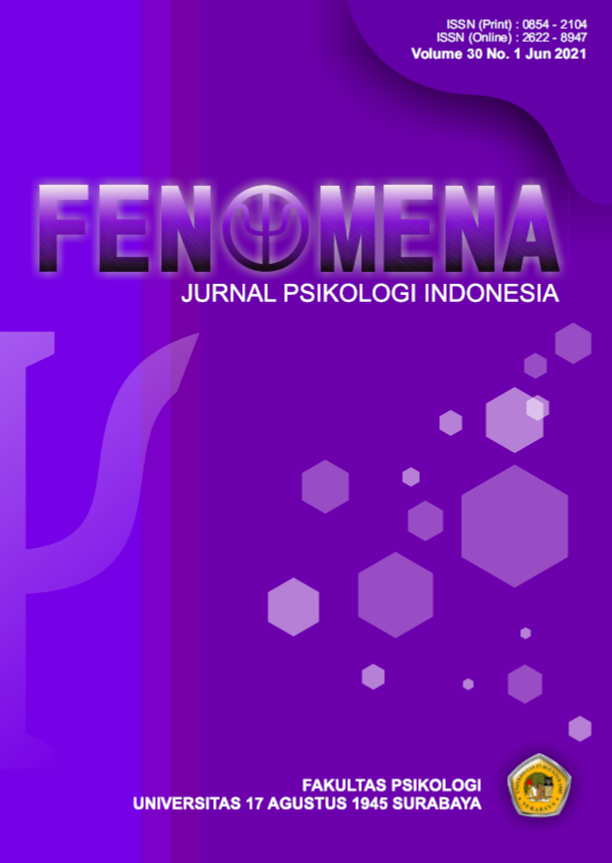Hubungan Work-family Culture terhadap work-family conflict pada karyawan work from home
DOI:
https://doi.org/10.30996/fn.v30i1.5417Keywords:
work-family conflict, work-family culture, work from homeAbstract
Penelitian ini bertujuan untuk mengetahui pengaruh work-family culture terhadap work-family conflict pada karyawan yang melakukan Work from Home (WFH) sebagai akibat dari kebijakan Pembatasan Sosial Berskala Besar (PSBB). Penelitian sebelumnya menyebutkan bahwa work-family culture memiliki hubungan yang kuat dengan work-family conflict. Jumlah partisipan penelitian ini yaitu 77 orang yang pernah melakukan WFH dalam 6 bulan terakhir. Analisis data dilakukan dengan analisis regresi linear berganda menggunakan IBM SPSS Statistic 22. Hasil penelitian ini menunjukkan bahwa work-family culture memiliki pengaruh signifikan terhadap work-family conflict (p<0,05). Dimensi dukungan manajerial dan konsekuensi karir negatif pada work-family culture tidak memiliki pengaruh yang signifikan terhadap konflik peran ganda. Pada dimensi tuntutan waktu organisasi memiliki pengaruh yang signifikan terhadap konflik peran ganda (0,004<0,005).Downloads
References
Allen, T. D. (2001). Family Supportive Work Environments: The Role of Organizational Perceptions. Journal of Vocational Behavior, 58(3), 414–435. https://doi.org/10.1006/jvbe.2000.1774
Anderson, S. (2002). Formal Organizational Initiatives and Informal Workplace Practices: Links to Work–Family Conflict and Job-Related Outcomes. Journal of Management, 28(6), 787–810. https://doi.org/10.1016/S0149-2063(02)00190-3
Andreassi, J. K., & Thompson, C. A. (2006). Work-Family Culture "Current Research and Future Directions". 2005, 331–351.
Beauregard, T. A. (2011). Direct and Indirect Links Between Organizational Work-Home Culture and Employee Well-being: Work-home culture and employee well-being. British Journal of Management, 22(2), 218–237. https://doi.org/10.1111/j.1467 8551.2010.00723.x
Breaugh, J. A., & Frye, N. K. (2008). Work–Family Conflict: The Importance of Family-Friendly Employment Practices and Family Supportive Supervisors. J Bus Psychol, 22(4), 345–353. https://doi.org/10.1007/s10869-008-9081-1
Carlson, D. S., Kacmar, K. M., & Williams, L. J. (2000). Construction and Initial Validation of a Multidimensional Measure of Work-Family Conflict. Journal of Vocational Behavior, 56(2), 249–276. https://doi.org/10.1006/jvbe.1999.1713
Dockery, A. M., & Bawa, S. (2018). When two worlds collude: Working from home and family functioning in Australia. International Labour Review, 157(4), 609–630. https://doi.org/10.1111/ilr.12119
Eisenberger, R., Huntington, R., Hutchison, S., & Sowa, D (2011). Survey of Perceived Organizational Support. https://doi.org/10.1037/t01207-000
Felstead, A., & Jewson, N. (2002). In Work, At Home (0 ed.). Routledge. https://doi.org/10.4324/9780203018965
Frone, M. R., Yardley, J. K., & Markel, K. S. (1997). Developing and Testing an Integrative Model of the Work–Family Interface. Journal of Vocational Behavior, 50(2), 145–167. https://doi.org/10.1006/jvbe.1996.1577
Golden, T. D., Veiga, J. F., & Simsek, Z. (2006). Telecommuting’s differential impact on work-family conflict: Is there no place like home? Journal of Applied Psychology, 91(6), 1340–1350. https://doi.org/10.1037/0021-9010.91.6.1340
Greenhaus, J. H., & Beutell, N. J. (1985). Sources of Conflict Between Work and Family Roles. Academy of Management Review, 10(1), 76–88. https://doi.org/10.5465/amr.1985.4277352
Helgeson, V. S. (2020). Psychology of Gender (6th ed.). Routledge. https://doi.org/10.4324/9781003016014
Kaduk, A., Genadek, K., Kelly, E. L., & Moen, P. (2019). Involuntary vs. voluntary flexible work: insights for scholars and stakeholders. Community, Work & Family, 22(4), 412–442. https://doi.org/10.1080/13668803.2019.1616532
Karatepe, O. M., & Kilic, H. (2007). Relationships of supervisor support and conflicts in the work–family interface with the selected job outcomes of frontline employees. Tourism Management, 28(1), 238–252. https://doi.org/10.1016/j.tourman.2005.12.019
Kossek, E. E., & Lee, K.-H. (2017). Work-Family Conflict and Work-Life Conflict. In Oxford Research Encyclopedia of Business and Management. Oxford University Press. https://doi.org/10.1093/acrefore/9780190224851.013.52
Lapierre, L. M., van Steenbergen, E. F., Peeters, M. C. W., & Kluwer, E. S. (2016). Juggling work and family responsibilities when involuntarily working more from home: A multiwave study of financial sales professionals: INVOLUNTARY TELEWORK AND WORK-FAMILY CONFLICT. J. Organiz. Behav., 37(6), 804–822. https://doi.org/10.1002/job.2075
Lippe, T., & Lippényi, Z. (2020). Co?workers working from home and individual and team performance. New Technology, Work and Employment, 35(1), 60–79. https://doi.org/10.1111/ntwe.12153
Sarbu, M. (2018). The role of telecommuting for work-family conflict among German employees. Research in Transportation Economics, 70(December 2017), 37–51. https://doi.org/10.1016/j.retrec.2018.07.009
Thompson, C. A., Beauvais, L. L., & Lyness, K. S. (1999). When Work-Family Benefits Are Not Enough: The Influence of Work-Family Culture on Benefit Utilization, Organizational Attachment, and Work-Family Conflict. Journal of Vocational Behavior, 54(3), 392–415. https://doi.org/10.1006/jvbe.1998.1681
Downloads
Published
Issue
Section
License
Authors retain copyright and grant the journal right of first publication with the work simultaneously licensed under a Creative Commons Attribution 4.0 International License that allows others to share the work with an acknowledgment of the work's authorship and initial publication in this journal.






